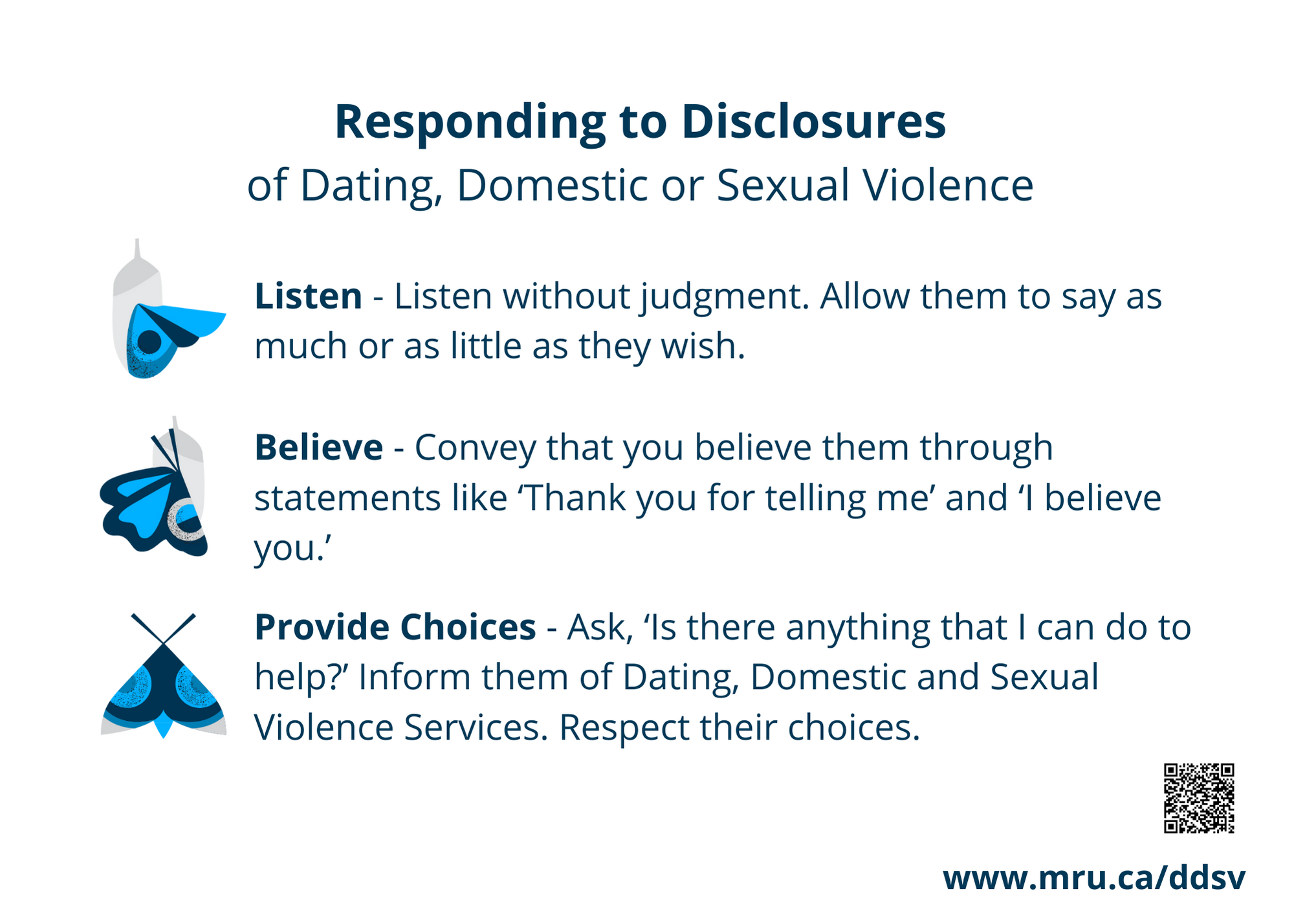DDSV Office: Sexualized & Gender-Based Violence Support
Sexualized and gender-based violence can adversely impact the well-being of a person and a community. Our goal is to provide Mount Royal University members with a safe and supportive environment to learn, live, and work by providing specialized support, advocacy, and education.
Get support
Specialized support is available for anyone who has been impacted by sexualized or gender-based violence.
Education
Workshops, guest lectures, training, and awareness initiatives at Mount Royal University.
Policy
The Gender-Based Violence and Misconduct Prevention and Response Policy was approved as of May 2023 at Mount Royal University.
Reporting Information
If you have experienced a concern related to dating, domestic, and/or sexual violence and would like to report it to Mount Royal University, DDSV Services can assist you with making a report.
Book an appointment with DDSV Services
You can inform Mount Royal University of an incident of sexualized or gender-based violence that occurred and remain anonymous.
For many people, making a decision about reporting to the police can feel complex and overwhelming. DDSV can help with:
- Answering questions about reporting and the police and court system
- Emotional support
- Making appropriate referrals
Resources and Information

Ensure safety. If there is immediate danger, offer the person who was harmed the option to have you call emergency services at 911 or campus security at 403.440.5900.
If you responded to a disclosure at MRU, you are encouraged to consult with Dating, Domestic, and Sexual Violence Services.
Some key messages that can be helpful are:
- I believe you
- This was not your fault
- You have the right to set your own limits in any relationship
- I am here to listen
- You are not to blame for someone else's behaviour
- Violence is never okay or justifiable
Things to avoid:
- Do not point out things that they could have done differently to prevent the assault or abuse from happening
- Do not question why they did or did not do certain things
- Do not ask that they tell you what happened
- Do not give advice
Offer options about what resources for support and reporting are available (find more support options here).
Take care of yourself. After receiving a disclosure and supporting, check-in with how you are feeling and what you might be needing to support yourself.
There is no right or wrong way to feel after experiencing sexualized and/or gender-based violence, and recovery takes time. Some common emotions that can show up include: shame, blame, fear, and guilt.
Many find talking to someone is helpful. DDSV is here to listen and discuss coping strategies, referrals, and resources.
Faculty Toolkit: Find tools and strategies to support your classroom.
Guest Lectures: To request a guest lecture, please email Hilary at ddsv@mtroyal.ca
Protection of privacy
Personal information provided is collected in accordance with Section 33(c) of the Alberta Freedom of Information and Protection of Privacy Act (the FOIP Act) and will be protected under the Act. It will be used for the purpose of fulfilling the duties of the support advocate and capturing aggregate (non-identifiable) statistical information concerning service use for the evaluation of programs.
Collected personal information is protected from unauthorized access, collection, use, and disclosure in accordance with the FOIP Act and can be reviewed upon request subject to the provisions under the Act.
Should you require further information about the collection, use and disclosure of personal information, please contact: Information Management & Privacy Advisor- University Secretariat - Mount Royal University - 4825 Mount Royal Gate SW, Calgary AB, T3E 6K6 - (403) 440-7288 - foip@mtroyal.ca



